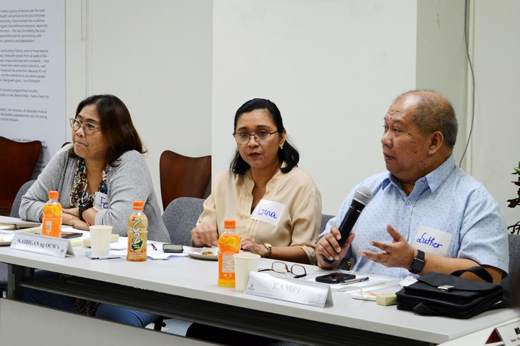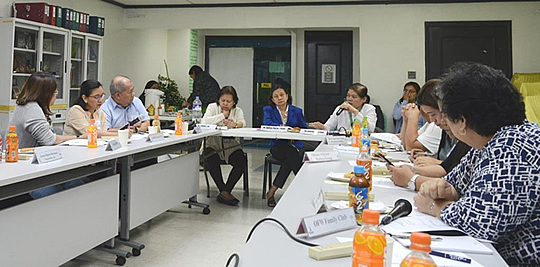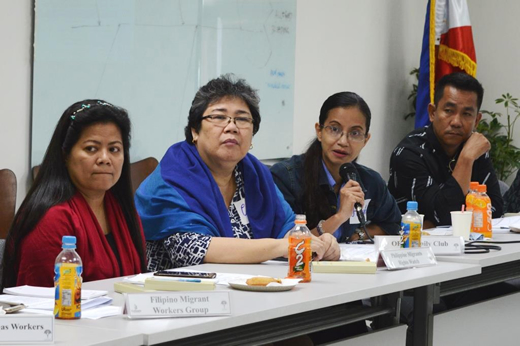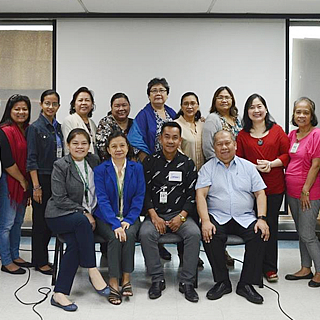PhilHealth
home | contact us | sitemap | disclaimer
News
PhilHealth Consults OFWs on Program Sustainability Initiatives September 18, 2017
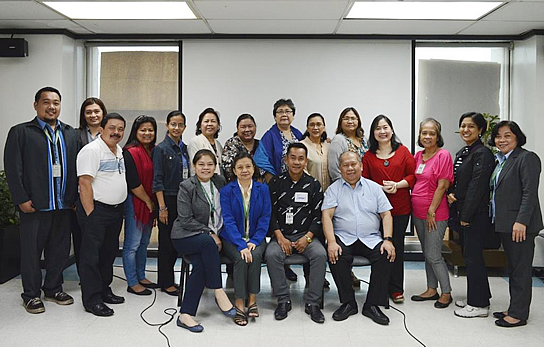
REPRESENTATIVES of Overseas Filipino Workers’ (OFW) organizations were recently consulted on the proposed measures to ensure the sustainability of the National Health Insurance Program (NHIP).
In a dialogue initiated by the Philippine Health Insurance Corporation (PhilHealth) at its Head Office in Pasig City, OFW groups shared their issues and concerns, particularly on the planned upward adjustment in the premium contribution rates starting 2018.
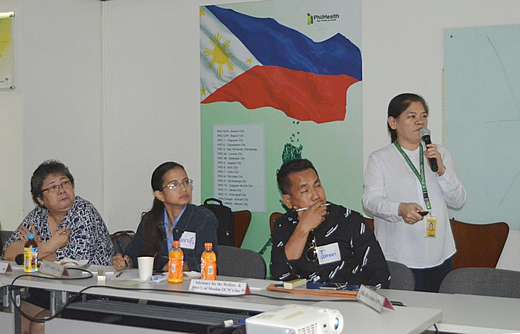
The dialogue was spearheaded by PhilHealth officers Nerissa R. Santiago, OIC-Senior Vice President for Actuarial Services and Risk Management Sector and concurrent Vice President, Office of the Actuary, Dr. Narisa Portia J. Sugay, OIC-Vice President for Member Management Group, and Chona S. Yap, Senior Manager for Overseas Filipinos Program Office.
Present during the consultation were Luther Calderon of KAMPI/ Kabalikat ng OFW Inc., Fe Nicodemus of KAKAMMPI, Karen Mapalad of Filipino Migrant Workers Group, Jojie Miranda and Ruth Ubaldo of Global Filipino Movement Foundation Inc., Gina Espinosa of KAIBIGAN, Lilia Raflores of Zonta Club of Quezon City, Jomarie Aquino of Advocacy for the Welfare and Development of Muslim OCWs Inc., Hannah Señeres of OFW Family Club and Host, Radyo OFW on Radyo Pilipinas, Susan Ople and Fort Jose of Blas F. Ople Policy Center and Training Institute, Gemma Comiso of Pinoy Expat OFW Blog Awards and Carmelita Nuqui of Philippine Migrant Rights Watch.
Sugay clarified that PhilHealth is moving towards universal coverage, hence there is a need to expand its coverage to those who are not yet covered by PhilHealth, including the migrant workers.
She added that for the past years without increasing the premium contribution rates, the agency were able to enhanced its benefit packages to make these more responsive to what PhilHealth members needed. For instance, Sugay said, the Z Benefit Packages provided substantial coverage for such conditions as Acute Lymphocythic Leukemia (ALL), Early Breast Cancer (stage 0 to IIIA), Prostate Cancer (low to intermediate), Kidney Transplantation for end-stage kidney disease (standard risk), Tetralogy of Fallot, closure of Ventricular Septal Defect for children, Cervical Cancer stages I to IV, and the ZMORPH (Mobility, Orthosis, Rehabilitation and Prosthesis Help), among others. “Kung natatandaan po ninyo, ‘yun yung malalaking benefits na hundreds of thousands ang ibinabayad ng PhilHealth for some diseases or illnesses na kung hindi ka miyembro ng programa, nakauubos talaga ng resources ng pamilya para lamang mabigyan ng karampatang treatment ang pasyente.”
Santiago presented PhilHealth’s financial status and some projections for the sustainability of the program. She also explained the three (3) dimensions of universal health coverage (UHC). One dimension is the coverage rate or the coverage ratio of PhilHealth. Santiago said that as of December 2016, PhilHealth already covered 90 percent of the population, meaning, there remains 10 percent more of the Philippine population that PhilHealth needs to cover.
The second dimension is the expansion of PhilHealth benefits to include the implementation of the Primary Care Benefit Package to other member sectors.
The third dimension is the increase in contribution scheme which was approved by the PhilHealth Board of Directors for 2018. Under the new scheme, the premium contribution of the land-based OFWs will increase from P 2,400 to P 3,600 per year, while the sea-based OFWs who belong to the Formal Sector will have a 0.25 percent upward adjustment from its contribution rate of 2.5 percent.
Santiago stated that from 2016 to 2026, the gap between the contribution and benefit expenses is increasing, hence, funds may not be sustainable for the next ten (10) years if PhilHealth maintains its status quo. “This is the reason why we are adjusting the contribution scheme,” she clarified.
The OFW representatives called for a deferment of the premium increase to 2019 in light of current economic conditions in some countries. Some of them also appealed for an improvement of PhilHealth’s services and benefits for their sector, and for PhilHealth to explore other possible sources of funds. Others commented that PhilHealth “had no added value” for them since they have better health insurance coverage abroad; and that OFWs must be exempted from paying the premium altogether. Other representatives also recommended that PhilHealth should take note of the concerns raised by OFWs in PhilHealth’s official social media sites, and for the government agency to be more active in the Pre-Departure Orientation Sessions (PDOS).
Another round-table discussion with other OFW organizations is scheduled this month. (END) (By Faudia H. Subillaga; Photos by Arlene B. Enriquez)
(Reference: Dr. Israel Francis A. Pargas, Head Executive Assistant and Concurrent OIC-Vice President for Corporate Affairs Group, Cel No. 0917-8089399)
